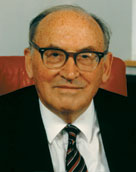Maurice Vincent Wilkes
|
|
Maurice Vincent Wilkes (born June 26, 1913 in Dudley, Staffordshire, England) is a British computer scientist, credited with several important developments in computing.
Wilkes studied at St. John's College, Cambridge from 1931 to 1934, continuing to complete a Ph.D. in physics, on the topic of radio propagation of very long radio waves in the ionosphere in 1936. He was appointed to a junior faculty position of the University of Cambridge through which he was involved in the establishment of a computing laboratory.
Wilkes was called up for military service during WWII and worked in radar and operational research.
In 1945, he was appointed as the second director of the University of Cambridge Mathematical Laboratory (later known as the Computer Laboratory).
The Cambridge laboratory initially had many different computing devices, including a differential analyser. He obtained a copy of John Von Neumann's prepress description of the EDVAC, a successor to the ENIAC under construction by Presper Eckert and John Mauchly at the Moore School of Electrical Engineering. He had to read it overnight because he had to return it and no photocopy facilities existed. He decided immediately that this was the way computing must proceed.
Since his laboratory had its own funding, he was immediately able to start work on a small practical machine, the EDSAC. He decided that his mandate was not to invent a better computer, but simply to make one available to the university. Therefore his approach was relentlessly practical. He used only proven methods for constructing each part of the computer. The resulting computer was slower and smaller than other planned contemporary computers. However, his laboratory's computer was the first practical stored program computer to be completed, and operated successfully from May 1949.
In 1951, he developed the concept of microprogramming from the realisation that the Central Processing Unit of a computer could be controlled by a miniature, highly specialised computer program in high-speed ROM. This concept greatly simplified CPU development. Microprogramming was first described at the Manchester University Computer Inaugural Conference in 1951, then published in expanded form in IEEE Spectrum in 1955. This concept was implemented in EDSAC 2, which also used multiple identical "bit slices" to simplify design. Interchangeable, replaceable tube assemblies were used for each bit of the processor. This was extremely advanced for the time.
The next computer for his laboratory was the Titan, a joint venture with Ferranti Ltd. It eventually supported the UK's first time-sharing system and provided wider access to computing resources in the university, including time-shared graphics systems for mechanical CAD.
A notable design feature of the Titan's operating system was that it provided controlled access based on the identity of the program, as well or instead of, the identity of the user. It introduced the password encryption system used later by Unix. Its programming system also had an early version control system.
Wilkes is also credited with the idea of symbolic labels, macros, and subroutine libraries. These are fundamental developments that made programming much easier and paved the way for high-level programming languages.
Later, Wilkes worked on an early timesharing systems (now termed a multi-user operating system) and distributed computing.
In 1956 he was elected a Fellow of the Royal Society.
Wilkes received the Turing Award in 1967, with the following citation:
- Professor Wilkes is best known as the builder and designer of the EDSAC, the first computer with an internally stored program. Built in 1949, the EDSAC used a mercury delay line memory. He is also known as the author, with Wheeler and Gill, of a volume on "Preparation of Programs for Electronic Digital Computers" in 1951, in which program libraries were effectively introduced.
The laboratory developed most of its software in Algol, and contributed to the development of Algol 68, the most advanced standard form of Algol.
Toward the end of the 1960s, Wilkes also became interested in capability-based computing, and the laboratory assembled a unique computer, the Cambridge CAP.
In 1974 Wilkes encountered a Swiss data network (at Hasler AG) that used a ring topology to allocate time on the network. The laboratory initially used a prototype to share peripherals. Eventually, commercial partnerships were formed, and similar technology became widely available in England.
In 1980 he retired from his professorships and post as the Head of the laboratory and joined the central engineering staff of Digital Equipment Corp. in Maynard, Massachusetts.
In 1986 Wilkes returned to England, and became a member of Olivetti's Research Strategy Board. In 1993 Wilkes was presented, by Cambridge University, an honorary Doctor of Science degree. In 2002, Wilkes moved back to the Computer Laboratory, University of Cambridge, as an Emeritus Professor.
External links
- List of papers (http://www.cl.cam.ac.uk/~mvw1/list-of-papers.txt)
- Home page (http://www.cl.cam.ac.uk/users/mvw1/)
- Biography of Maurice Wilkes (http://ei.cs.vt.edu/~history/Wilkes.html)
- Computer Laboratory, University of Cambridge (http://www.cl.cam.ac.uk)de:Maurice V. Wilkes

